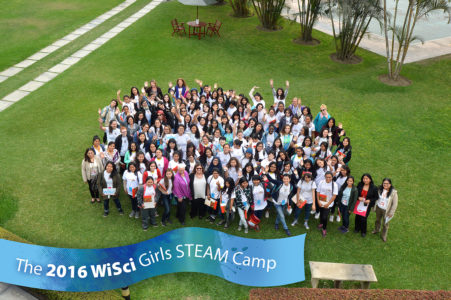
CIP was proud and honored to host the WiSci Steam Girls Camp at CIP’s Lima, Peru campus onAugust 3rd. In coordination with the US State Department CIP hosted over 100 high school age girls and gave them an opportunity to see what agricultural research looks like in the labs and fields of the CIP campus.
During the afternoon the girls rotated through six different stations that gave them hands on experience working with CIP scientists. The stations included extracting DNA in the virology lab, learning about cryopreservation of genetic material in the CIP Genebank, observing multispectral image analysis of crops with drone technology, learning about CIP’s breeding programs for improving nutritional value of potato and sweetpotato, the benefits of growing seed potatoes in Aeroponic greenhouses, and a tour of the Genebank — home to over 4,500 varieties of potatoes and over 6,000 varieties of sweetpotatoes. The visit also included a session led by Director General Dr. Barbara Wells, Dr. Hannele Lindqvist-Kreuze, Dr. Flor Rodriguez, and Blg. Giovanna Müller who shared inspirational stories about how they first became interested in science and what it means to them to be women in science.
The two-week program hosted 100 girls—talented and driven high school students from Chile, Mexico, Peru, and the United States—learn science, technology, engineering, arts and design, and mathematics (STEAM) skills and encourage them to pursue careers in those fields.
As part of the Let Girls Learn initiative, the camp is a public-private partnership designed to expand STEAM education opportunities for adolescent girls. This year’s camp is also part of a broader U.S.-led initiative through the Asia-Pacific Economic Cooperation (APEC) forum to enhance women’s participation and advancement in STEAM fields in the 21 APEC economies.
The program was led by industry experts and conducted in Spanish. Campers learned about coding and app development, engineering and robotics, renewable energy, micro- and molecular biology, design, mapping, and sustainable development. Sessions also focused on leadership development and teamwork, cultural exchange, educational excursions, and mentorship opportunities.
